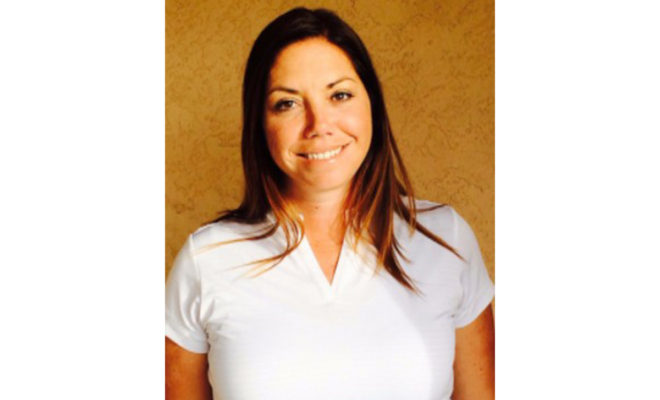Rules Roundtable

I grew up playing team sports. Soccer, basketball, softball, you name it I played it. I can’t remember a time when I didn’t love both watching and playing sports.
But it wasn’t until I got involved with the golf world that I became so aware of the rules of a sport. Sure, we fans complain about officiating in basketball and pull our hair out over a bad call in a Major League Baseball game, but there’s no sport that spends as much time discussing rules as golf, and I wasn’t used to it.
Because of my job, I’ve picked up more Rules of Golf knowledge than I would have ever imagined. But it’s still intimidating. There’s a lot I don’t know, and as somebody who only wants to play golf in casual settings and cares just as much about the social aspect as I do about the competition, I wonder what I am expected to know from a Rules perspective.
With that on my mind, I called upon some women who eat, sleep and breathe the Rules of Golf. We spent the good part of an hour and a half dissecting these topics I pondered above, and I’m bringing you the highlights. First, let’s meet the players:
Me, Julia Pine: I’ve worked at the SCGA for five years and would consider myself a Rules novice
Mary Shepperd: A member of the SCGA and USGA Rules Committees, a Rules expert
Pat Newmark: A member of the SCGA and USGA Rules Committees, a Rules expert
Linda Kueny: A member of the SCGA Rules & Competitions staff, a recent Rules student
Julia: Thanks everyone for coming today. First off, let’s share a little about how we got involved in golf and the Rules world.
Mary: My dad was a very avid golfer. I had two older sisters and neither of them took to golf. When I was 13 he taught me and I took, and it was the thing he and I did together. I continued playing on and off, but didn’t play much until I retired. I joined a women’s club and began playing on a regular basis. I began running into rules situations on the golf course and being told “this is what you are supposed to do.” I’d go home and look it up and someone would have been wrong. The frustration of not knowing got to me. I thought, I can’t play this game if I don’t know the Rules. I had a good friend involved in a rules committee, I attended NCGA Rules School, started studying, joined a committee and decided I wanted to do more. It really became my second career and my passion. I spent a lot of time studying and realized I love spending time on the golf course and out with the players.
Pat: I was DQed from a club championship. The reason I was DQed was I did not realize that when you are playing consecutive days at a tournament, you are not allowed to practice even after the round in the afternoon out on the course. I knew you couldn’t practice in the morning, prior to your tee time. But I was telling my husband about it, and how I was just going to tear it up the next day, and he told me he thought that was not allowed. I said “oh, honey,” as if I knew it all, “no you are thinking about the morning of.” But we got home and here he comes with the decision book, flipping through it, and he starts reading it to me, and honestly I burst into tears. I had been doing so well in the tournament. I went in the next morning and DQed myself. And I thought, if I’m going to play, I need to learn the rules. And I found out I was much more adept at learning the rules than I was at playing! I started really studying and found that I absolutely loved it, had an affinity for it. Never looked backward after that.
Linda: I used to hit balls in the backyard as a kid, but in school there weren’t many opportunities for girls. About nine years ago my boss at the time invited me out to play and I fell in love with the game again. That was before I started working at the SCGA, so when I got a job here it was just a dream come true environment. But I worked in the communications department and really wasn’t involved with the Rules. My first Rules experience came in my first competitive tournament and actually Pat was an official. I had headphones in and was listening to music, and Pat told me that wasn’t allowed. I was nervous to start and then I was even more nervous after that!
Pat: I remember that! There was a decision on that at the time. It wasn’t against the Rules per say. But the decision said if you were using whatever you were listening to as an aid, you were in violation.
Linda: She approached me to ask what I was listening to, which was Christmas music at the time. You learn by making those mistakes. If you’re not out on the course, you don’t see those types of rulings. I envy you both, admire you, for making the dedication to know the rules like you do. I am just starting out. But I have the desire.
Julia: I want to know what it’s like to learn and study the Rules. Sounds like a flashback to college classes.
Linda: It is! I went to Rules School for the second time this year and everyone says “learn the definitions and learn the Rule numbers” and I kind of wrote that off the first year. But those really are words of wisdom. It definitely takes time. I started out six months ago telling myself I’d learn one rule a night, but family got in the way.
Pat: I’ve tried that. It lasts about two nights!
Julia: Sounds like life.
Linda: It definitely takes dedication. I’ve met many people who are very competent in the rules, they have the technique and focus. They are always talking rules situations at meetings. For me to continue on I see you need that.
Pat: If you do it so long, my lord, you can’t help but learn it. It’s the same thing over and over again. But Mary and I are in the same boat. We don’t just learn it, we teach it. We teach ladies groups at clubs around here. There is no way to learn something as well as by teaching it. You know you are going to be peppered with questions. It’s fun to teach other people.
Mary: I would just add, for an average player, the required rules knowledge isn’t the same as what we are trying to achieve. We are trying to be experts in our arena. I studied harder for the rules than I did for anything in my life, and I have a Masters degree. Because it’s important to me to have that level of expertise. I’ve read the decisions book cover to cover every year for 14 years. Every time I pick up nuisances and subtleties I didn’t get the first 13 times. It’s an evolving process. Your level of understanding evolves over time. That’s a fun thing for us rules nerds. To keep learning and growing and knowing. But for an average golfer, they shouldn’t feel like they can’t play if they can’t achieve that level. You don’t have to be like us, but it’s fun to be like us! I’ve mentored people over the years, and you detect that glimmer that they are one of us. The first time they take the test they are overwhelmed and depressed, but you remind them that’s part of it. Next year will be better. The year after that the light bulbs will start to come on.
Linda: And every time you are in an event you see a instance where it puts the rules book into perspective. You see the application of the rule you read in the book. That helps a lot.
Julia: Why, in golf, are the Rules such a major topic? And is bifurcation an option you think is feasible to help grow the game?
Mary: They are needed to create a level playing field. But if I’m out on a Sunday playing with my friends, I’m not a rules official. Somebody hits the ball out of bounds, and they look to me, and I tell them “in the real world, sure, you’d need to go back to the tee and hit again, but today, just drop the ball back in play and have fun.” But if you are in a competition, and someone is going to win and someone is going to lose, you need the rules or it doesn’t even make sense. No two golf courses are the same, no two golf holes are the same, which is unlike any other sport. So the Rules are needed. But for just a basic average player, if you are learning the game and playing with your friends, in fact I stress not to worry about the rules. Don’t worry about taking a drop. Learn to play the game and learn to enjoy the game, first.
Pat: I have a brother that doesn’t know the rules. Doesn’t care about the rules. Thinks I’m nerdy. He has a group of friends, four of them, they made up their own rules and play by them. They figure if you get a penalty stroke for losing a ball, you should get an extra stroke back for finding a ball! They don’t play with anyone else, just themselves. As long as you’re playing in that really tiny world and not competing against others, it’s fine.
Mary: But they are playing by the rules! It’s just their own rules. I always laugh when I go out with my group of friends and they say “we don’t play by the rules because we allow gimmes. But then there are all these rules around the gimmes they’ve agreed upon!
Julia: So it sounds like you’re in favor of a common set of rules that everyone playing understands and agrees to play by. That’s the perameter.
Mary: Yes! A common game everyone is playing.
Julia: Golf is different because players have to self-police. There’s a huge honesty element. Thoughts?
Mary: Golf is a game of integrity. They tell us in Rules school, unlike all other sports, there is not an official with every player at all times. It’s up to the players to know the rules, to self-police. I find that really, when you get to elite amateur golf, the players have a mutual regard for each other and abiding by the rules. I don’t see cheating in golf. It’s rare. I’ve worked 100s of tournament days, and the instances stand out, because they are so rare. It’s much more common for a player to come to you and ask for your input. I can count on one hand the amount of times a player has been dishonest That’s one of the reasons we love being a part of this game.
Pat: I had an experience working a U.S. Amateur where a player was close to having relief because his stance was almost on a piece of old cart path. He walked over to me with a 3-iron in his hand. With that long of a club, his stance wasn’t on the cart path. But his father and coach were nudging him to say he was going to use a wedge. The rule states he needed to use the club he would have intended to use without the cart path there. I finally asked the coach and dad to step away and asked the player what club he would use. He said “ma’am, that’s why I’m standing here with a 3-iron in my hand.” He ended up hitting a great shot, and I thought, that kid has a bright future.
Julia: The Rules of Golf world seems male-dominated. Have you had that experience?
Mary: I worked in a male-dominated world, in high-tech, and I was often the only female in the room. The type of people I worked with were really gender blind, just a matter of how good and capable you were. I feel it’s the same in golf rules. For the most part very few times has anyone even cared if I were female as long as I knew the rules. The vast majority of golfers are men, and I’d like it to be more welcoming to women, to see more women love the game like I do, but I feel like that’s happening over time.
Pat: I haven’t noticed any discrimination at all. I think there must be some because there are not many of us out there officiating U.S. Opens. I remember once doing the men’s mid-am, and somebody turned to me and said “how does it feel to be the only female rules official” and I hadn’t even noticed. You just do what you do. And if people like Mary and I don’t screw it up, there will be many more!
Mary: Just showing up, being confident and fitting in is the best thing we can do. I know that will open the door to more women.
Linda: I think if you have an interest, the opportunity is there. Certainly a lot more than it used to be.
Pat: Up until 2002, officials didn’t need as high a score on the annual test to work the Women’s U.S. Open or Women’s Amateur, you only needed an 85, as opposed to the 92 you needed to work the equivalent men’s events.
Julia: Where did that come from?
Pat: I believe a lack of interest in working those events. But someone said “you are actually denigrating those events by not demanding a higher score. So yes, thinking about it, women’s golf and rules officiating has come a long way.
Julia: The Rules are ever-changing. What Rule would you want to change?
Mary: This sounds strange, but I don’t even go there. My purpose is to know the rules as they are written. I hear people complain about different rules all the time. For me what’s comfortable is to say this is what is written and we operate under those. I just don’t have that mindset.
Pat: That all cases of putting a ball back into play would always be a place situation, as opposed to sometimes a drop and sometimes a place. I think people often try to do their best and play by the rules, and drop when they should have placed and place when they should have dropped. And it’s a 2-stroke penalty!
Linda: I’m kind of black and white. I’m still learning the rules and they have credibility and guidance for me. I’m still in that mindset. Makes my life easier. I just want to learn them first before I throw one out the door.
Julia: Let’s hear it. Your “Strange But True” Rules story.
Pat: At the U.S. Open at Pinehurst I had a player from Scotland who, on the second day, was in good shape. But the poor man absolutely played himself out of the U.S. Open on his front nine on day two. Disaster two holes. It was about 10 a.m., we had started on his back 9, and there was a wait on tee. He walks over to me, with his accent, and says “hey Pat, question. Is it OK if I have a bit of beer?” And I thought, are you asking me if you can have a beer? He said “my caddy can get it for me.” I had never been asked that before, so I got on the radio and called the rover. Long pause, and he didn’t know either, so he tossed it up the chain higher. Then I just hear “no. no no no. This event can’t be that.” Here is the deal. The PGA TOUR has a rule that they cannot drink while on course.
Mary: Well, not a rule of golf, a standard of behavior.
Pat: And most of these guys are PGA members. But actually, this guy was on the European Tour, and I’m not sure if they have that rule, but the ruling came down and we went with that.
Mary: Last year when I worked the U.S. Open, it wasn’t my ruling but it came over the radio, “a player just informed me that his ball is in a hole. He saw a crab come out of the hole.” And he had to spell it, c-r-a-b, and he said “we need to know is crab a burrowing animal?” So they threw it over to one of the PGA TOUR guys they knew would know the answer and you hear this southern boy come over the radio and say, “yepppp, crabs are burrowing animals.” So now we know!
Julia: Anything we haven’t covered?
Pat: Just do it! If you’ve had any inkling of this, it’s not as scary as it sounds.
Mary: All of the golf associations offer rules seminars. Take a tiny bit of time and attend one. It’s pulling teeth to get people to attend one, but people are always glad they did. I used to bribe the players in my club by offering wine. By doing so I’d get good attendance. But by the end every single one is trying to buy me a glass of wine at the end because they had a good time and learned a lot. So, I just wish I could encourage a few more people to spend 45 minutes or half a day. They will gain so much and won’t feel like they wasted their time.











